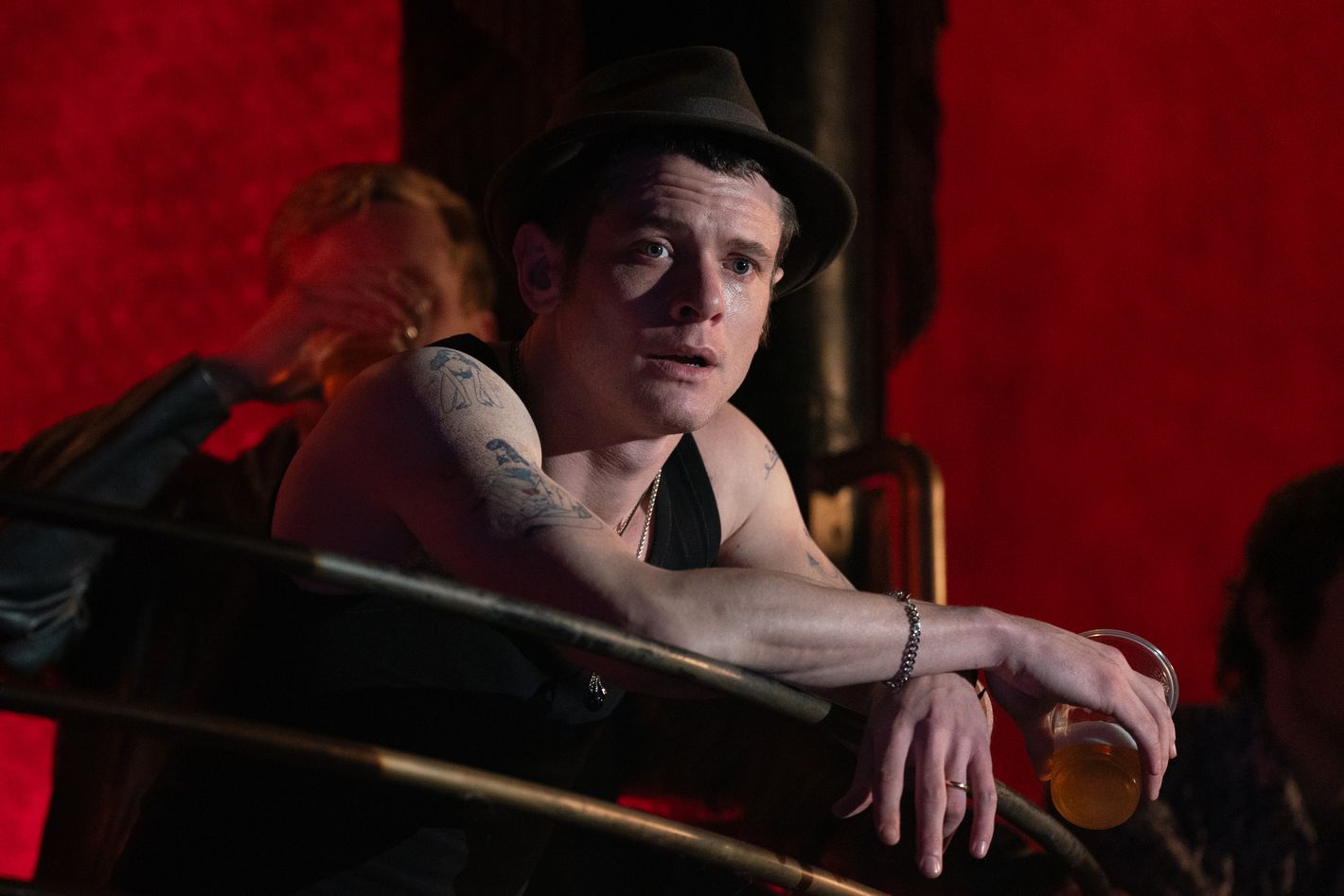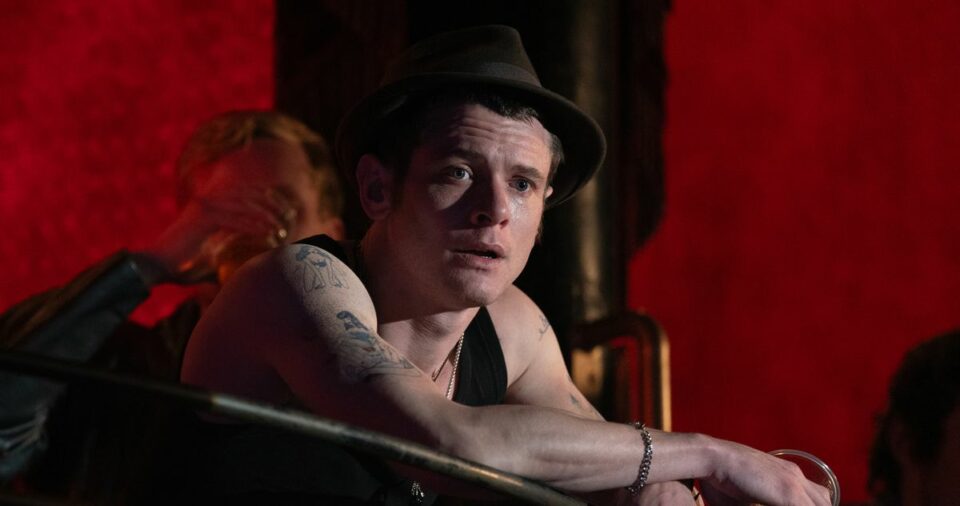
When Jack O’Connell’s version of Blake Fielder-Civil is introduced in Back to Black, he is — in O’Connell’s own words — “a bit of a hellion.” He’s celebrating a horse-race win in the middle of the day, knocking back beers with his friends and flirting unabashedly and constantly with Marisa Abela’s up-and-coming Amy Winehouse. Of course, he has a girlfriend he doesn’t tell Amy about, and of course he brings cocaine over to her apartment the first night they spend together. He’s exactly the kind of guy who seems appealing when you’re looking for a bit of danger, so volcanically charming that you might not see how his cocky grin is fueled by equal parts self-destruction and confidence.
The way director Sam Taylor-Johnson and screenwriter Matt Greenhalgh avoid re-creating certain on-the-record elements of Fielder-Civil’s relationship with Winehouse (like his admission that he introduced her to heroin) has divided critical responses to Back to Black. But O’Connell, who spent an afternoon with Fielder-Civil to prepare for the film, defends its approach, saying the script “blindsided” him with its focus on the pair’s connection. Taylor-Johnson has said O’Connell was “the only person” she could think of for the role, which is indeed a showcase for elements of his previous performances. It requires a wiry physical presence, as seen in Starred Upand Godless; a rough-and-ready romantic appeal, as in Little Fish and Lady Chatterley’s Lover; and a hidden core of self-critical vulnerability, as in Jungleland and The North Water. “We’re not pointing fingers. The easy narrative is to say, ‘Look at this guy. Look what he’s doing — he’s bad news. Why did she ever fall for him?’ But the reality is not that simple,” O’Connell says.
You’ve described this less as a biopic and more as a reimagination, and I’m wondering if that twist is what appealed to you the most.
Definitely. Much later from jumping on the project, I was made aware that a lot of the script was informed by her lyrics. And I just thought, What a perfect catalyst, to bring it back to the lyrics and to portray these people as they’re being described by Amy through her music. She was such an honest musician and an honest songwriter that it makes total sense. No one’s trying to say this is how it happened, when it happened, beat by beat. I don’t think, unless you were there, you can ever expect to know that entirely. So to be able to chat with Blake, who was there, and marry his version of events into this story for me, to get my end of it right — that felt like a lovely couple of key ingredients. That meeting gave me certain license to go, There’s the guy who has been very, very heavily publicized. Then there’s the guy I met, albeit several years on. But there was so much that was genuine about that interaction I had with him.
Did you have elements of your performance already determined before meeting with him?
A lot of it initially was feeling like I understood the period; I understood the — I hate this cliché, but — Zeitgeist of that period. I understood the attitudes of the time. I even understood the attitudes of tabloid media at that time through growing up in the U.K. amid the kind of immoral level of intrusion. We met up prior to the shoot; it was just an afternoon. I recognized in him exactly that type of fellow who was cutting about back then, a typical geezer. Someone fun to be around, quite a magnetic personality. He charges into the pub having just had a result on the horses. What a great fucking starting point. We meet him coming into this boozer, ready to splash the dosh. For me, that was the tagline, and I built it from there. Sam was totally game for all that playfulness and the silliness and the charm.
Blake was constantly on hand if I had questions. We stayed in touch, even to the point of him seeing the film and his feedback, and it’s positive. That’s a really important review to me, his. I’m not going to go into exactly what he said, but what he said was beyond what I could have ever expected.
In early profiles of you, there’s a focus on your childhood, your “run-ins” with the law, and your partying days. In one of them, you said, “When I was younger, I got into a lot of trouble and was made to feel guilty for a long time.” I’m curious if that tendency for people to try to define you by your past was something you saw in common with Blake.
If anything, you’ve made me aware of that link. It was not something I’ve been conscious of until you said it. I feel a great degree of compassion for Blake — and empathy. I think it’s always key to point out that these are people in their 20s. And with how that relates to me, where I was then, it’s very different to where I am now. Same goes for Blake. The same would apply to Amy if she were here. I think it’s all part and parcel of growing up, isn’t it?
Was there a lived experience that informed the role the most?
The main element of that was just having some reckoning of this time and this period. Just being able to be fully nostalgic about this era, which is an era I am nostalgic about anyway. I think the music was great then, and I think Camden was brilliant. I think our U.K. music scene was, like, world-beating. [Laughs.] Some people might disagree, but I loved it. I loved being around London in this era. You could stumble across anything, step outside with no intentions and see amazing bands and be at amazing venues and hang around with amazing people. I was a kid at this time, so I definitely wanted to bring that into the role, and I thought it was important for the film to make you feel like you were there again, and I think it does. I was having the time of my life ’cause I was just pretending it was the noughties again. I got a massive buzz off that.
When you got the script for the first time, do you remember the first scene you read that made you think, This has to be me? What was that moment?
When I first read the Shangri-Las section, where he impromptu bursts out into a performance of “Leader of the Pack.” I had to read that about four times before I accepted that it was in the script. It wasn’t a no-brainer before reading it. This story is fraught with all sorts of badness. By the time I finished reading it, it was clear that, no, we’re actually telling the very in-depth version, the very colorful version. There’s probably more emphasis on the joy in Amy’s life and celebrating that about her than the eventual end we all know so well, unfortunately.
Can you talk to me about filming that scene? How did you prepare for that?
The actual Shangri-Las piece, it was one thing on paper, but once I saw it, I thought, No, we’re going there. We are going there. I want at least a verse and a chorus, and I’m gonna make it really difficult for Sam to cut it. I practiced in my bathroom in front of the mirror. I was listening to the tune over and over again, watching the music video over and over again. The spirit of the Shangri-Las, I wanted to bring all of that in. And I knew I had that as an ace up my sleeve, once I’d worked enough on it. I was nervous about that initial meeting scene because we had to get it right; so much depended on it. Obviously with that, there comes an element of nervousness. Yeah, I’m quite nervous in that scene.
Do you feel like the nervousness helped?
I think the nervousness helped. I’m certainly less nervous once we’ve cracked it and we know the shape of the scene and then I’m more available to play around. But Marisa — she’s just great, man. She is a powerhouse. I think this film has got every chance because of her. And that is also a testament to Sam as a director for cultivating that atmosphere. It helped that we were in a pub, which is a very comforting environment anyway. All the alcohol on set is zero percent, but even the act of supping a pretend beer just gives you these comforts and safety nets to be able to go in and say [of Blake and Amy’s first meeting], Okay. This is relatable. I feel like a dinosaur saying this, but that sort of charisma, that sensibility of that period, that backwards and forwards, not taking yourself too seriously, taking the piss out of yourself and out of the situation, shit-talking — Amy definitely embodied that. You can see it in her interviews. She was an embodiment of Camden at that time.
Later in the film, there’s a scene in Miami, where Blake gives Amy a jewelry box, and inside of it are glowing crack rocks. It feels like the one surreal moment in a film that is otherwise very grounded. What were your reactions to that scene?
I suppose with anything like that, to an extent, you can’t be judgmental. When you’re trying to understand the reality — if you’re trying to understand it — you don’t wanna be judgmental. Yeah, it is surreal. We’re trying to make a massive point quite subtly. When you understand the naïveté around drugs at the time and how young these people were and how readily accessible it must have been for both of them — it’s such an evil concoction, especially when you throw in success. That’s wildfire. We’re not pointing fingers. The easy narrative is to say, “Look at this guy. Look what he’s doing — he’s bad news. Why did she ever fall for him?” But the reality is not that simple.
What interested me about the morning-after cocaine scene and the honeymoon-in-Miami scene is that both are incredibly romantic moments between Blake and Amy, and drugs are also there. They fell for each other, and they cared for each other. But also, the drugs are there.
Yeah, brilliant. I think addiction on the whole is an awful thing. It’s an evil, and there comes a point where the only thing that matters is the drugs. They go from always being there to the only thing that’s there and the only thing that really matters, and everything else takes a back seat.
You’ve played characters who have struggled with addiction over the course of your career: Skins, The North Water, now this film. Has your approach to playing someone with addiction changed over time?
I think every circumstance is in a vacuum. There might be similarities, but each circumstance is unique. I find that I have a lot of empathy and a lot of compassion for addicts. And in a lot of cases, and in Amy’s case, you see these people that had so much to give, so much potential, and it was kind of contributing to the undoing of them. There’s a tragedy in that that really moves me as a storyteller, as an artist. It’s something I wanna understand and wanna help people understand. I guess that is the motive.
The North Water director and writer Andrew Haigh said of you as an actor, “Jack wants to be hurled into the air without a crash mat. He is so deeply committed to finding the gnarly truth of a moment.” Was there a moment while making Back to Black when it felt like you were being hurled into the air without a crash pad?
There’s an element of that every day, do you know what I mean? With every scene, there’s an element of that. [Pauses.] I like that analogy. It’s very illustrative.
The way that you talked about the Shangri-Las scene, it seemed like that might be in the running.
Yeah, because you don’t know if anybody’s going to like it, either. You can hope for the best, but if it’s just met with dumbfounded glares after they call “Cut,” obviously that is soul-destroying. You gotta take risks and embrace the failure. Failure is your friend.
This interview has been edited and condensed for clarity.
Roxana Hadadi , 2024-05-21 14:00:00
Source link


